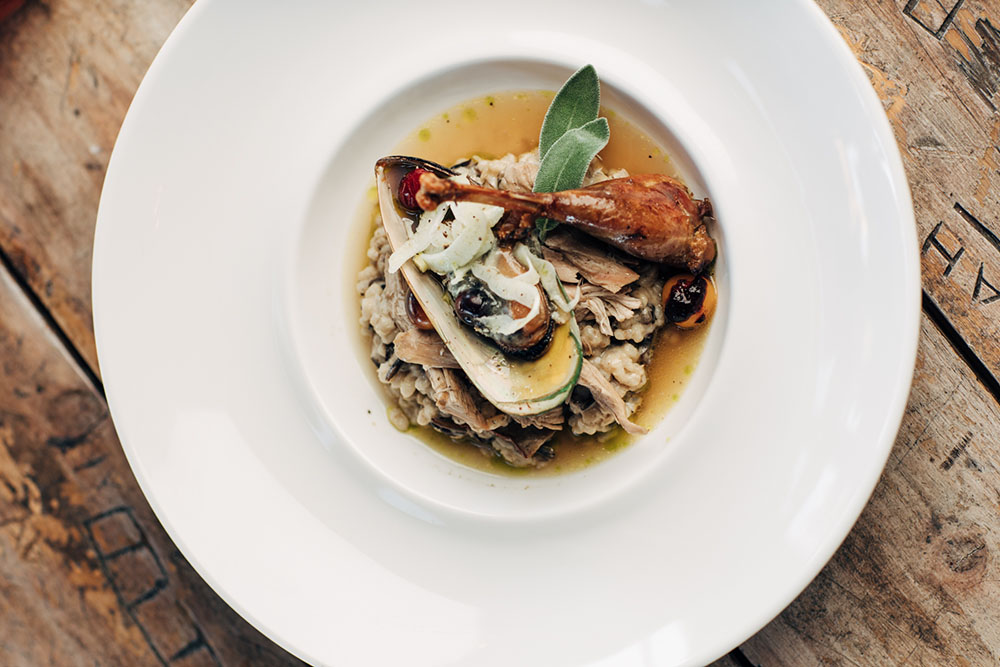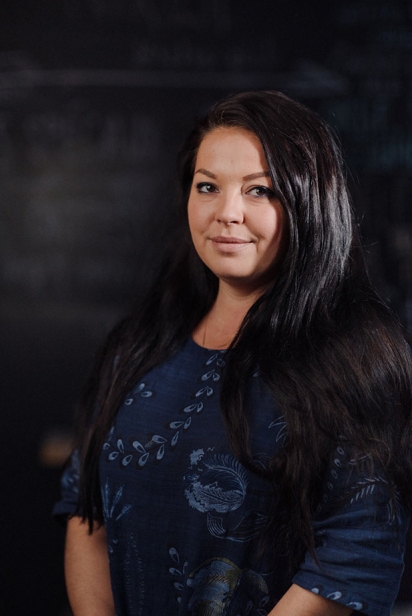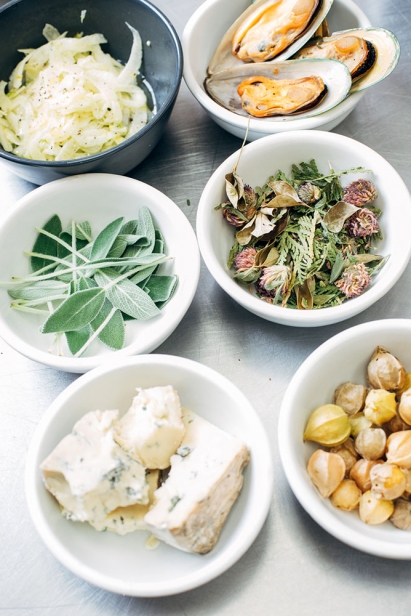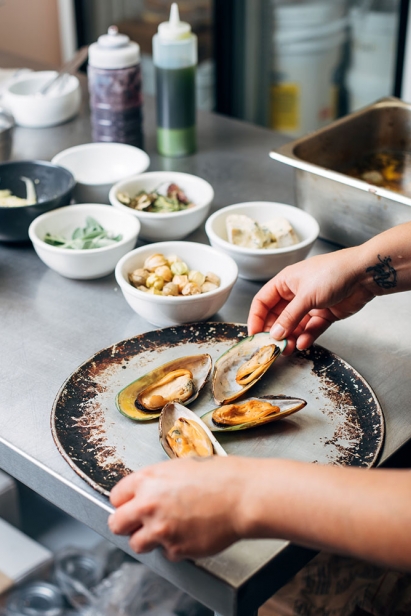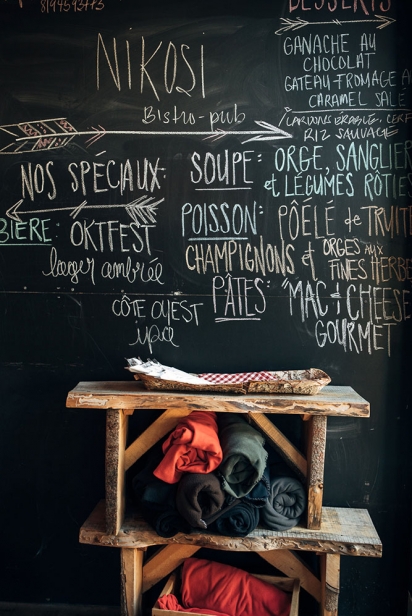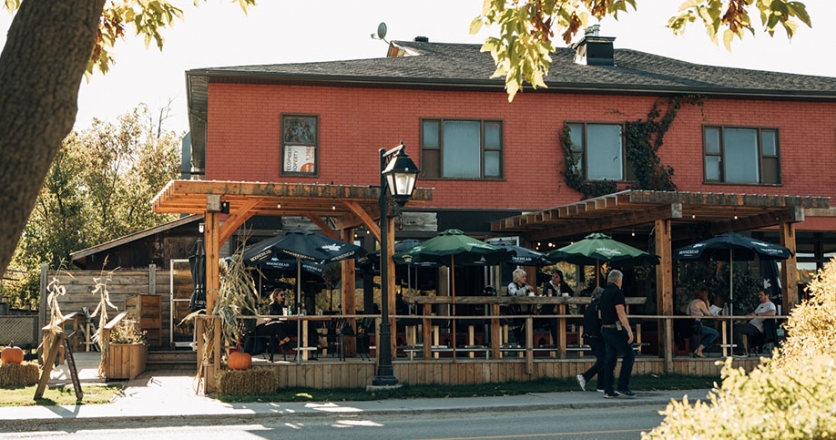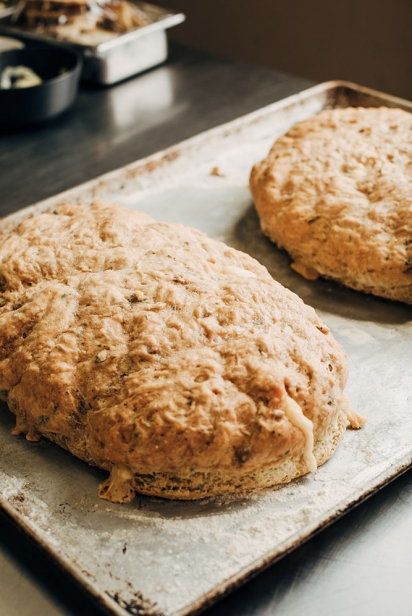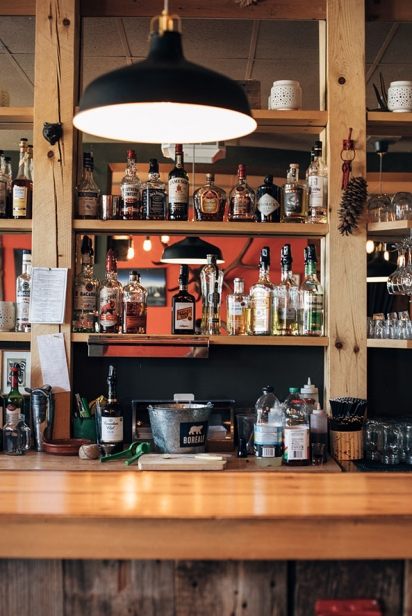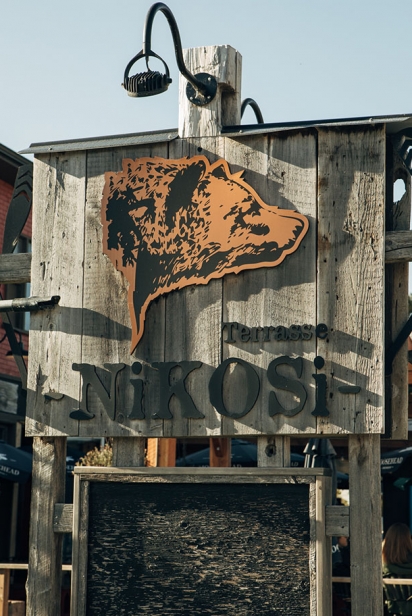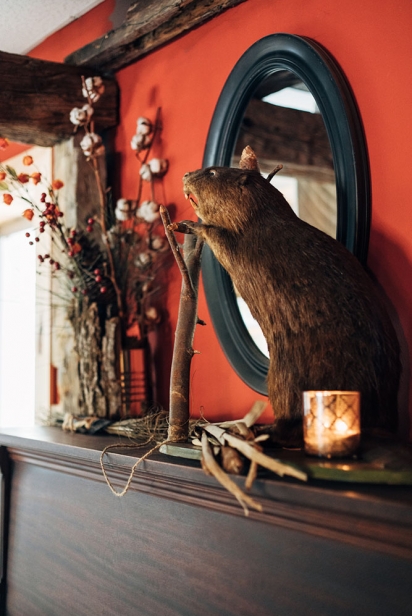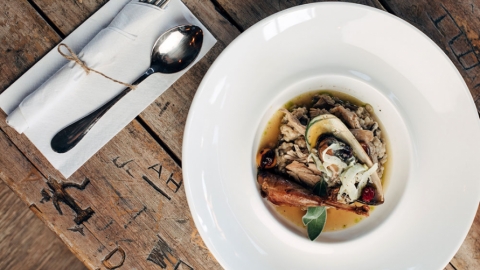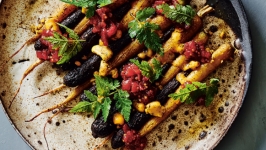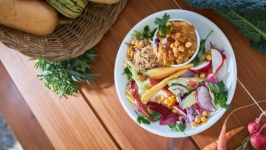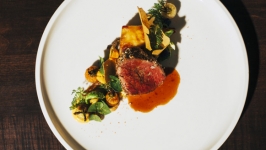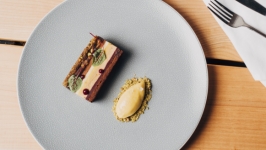Food From the Heart
It’s a busy fall Friday afternoon at Nikosi Bistro Pub and owner and chef Wapokunie Riel-Lachapelle is describing the dish edible challenged her to make. We asked for something that represents her on a plate and she met the challenge, down to every last ingredient.
“It’s just kind of based on my memories and my travels around Canada,” says the self-taught cook now based in Wakefield.
It’s a barley and wild rice risotto, topped with pheasant that was cooked in Belgian beer with wintergreen, red clover blossoms, cedar, sage, gooseberries, cranberries and mushrooms.
“I used the juice from that to make the risotto. On top of the dish, a smoked Nova Scotia mussel on the half-shell perches sideways. It’s done Rockefeller-style, with fresh blueberries, a “touch” of maple syrup, chive oil, shaved fennel and Ciel de Charlevoix blue cheese.
“It should be a bunch of flavours that pop in your mouth,” Riel- Lachapelle says.
The pheasant in the dish speaks to the fact that her father had a pheasant farm in Charlevoix — the same place from which the cheese hails — at one point in her late teens. As for the blueberries, she has really early memories of spending long summer days picking them at another homebase in Abitibi- Témiscamingue with some of her four siblings.
And she remembers being weary of the fresh food they grew up eating.
“I remember saying ‘Oh, we’re eating partridge and fish again?’ And I remember thinking how unfair the world was that we were eating pheasant and trout that we hunted or caught — again. I wanted to eat Kraft Dinner like my friends. Later, I learned how lucky I was.”
The barley in the risotto is inspired by her mom, who, being from Quebec City, would regularly make barley soups from scratch.
“But she’d make a barley soup with partridge in it,” Riel- Lachapelle recalls. “Or my dad would make pheasant with wild rice. I was blessed from a young age with knowing how to make things from scratch and how to hunt, trap hares and fish. My mom would also make hare pies."
Her father was ahead of his time in the nose-to-tail department.
“We always used everything from the animal we were hunting,” she says, and adds that she’s learned from his resourcefulness, even in opening the restaurant. “I built the patio that wasn’t here before,” she says of the beautiful deck that adds dozens of seats to her restaurant in temperate weather and overlooks the river, even offering a glimpse of the legendary Wakefield covered bridge. When she moved into the space, what are now a back prep kitchen and office weren’t for rent, but she's been able to add them in her three years of business. She also had the benches on the patio custom-made in her own design: The bottoms of the benches look like the Wakefield covered bridge.
Still describing the dish, she explains that the chanterelles are local and the shiitakes bring her back to the 10 years she spent in Vancouver, after leaving Wakefield, where she lived with her family until she was 17, to move out west and pursue her culinary dreams.
The mussel is also a nod to her Vancouver days.
“I spent 10 years in B.C.,” she says. “The Haida tribes are very proud and there’s a nice mixture between the cultures. The mussel related to my experience on that side.”
Meanwhile, the wintergreen and sage are reminiscent of her time spent in the bush, hunting with her father. The Belgian beer is a nod to her mother, who studied archeology in Brussels. “When my mom and dad had a drink, it was always Belgian beer,” she says.
Loyal to local
At the restaurant, Riel-Lachapelle’s philosophy is to use and celebrate as many local ingredients as possible. Although she does smoke some of her own items, she also shops at the Smoke House in Chelsea and Maison du Gibier, north of Quebec City. Many of her meats also come from La Maison du Gibier. She buys bread locally, except for bannock, which they make in-house and which is the staple bread at Nikosi. It was also her staple bread when she was growing up. For school lunches, her sandwich was always made of bannock, which her mother learned how to make from the elders.
“It was a not a typical sandwich,” she says with a laugh. “Inside, it might have a pheasant pâté that my dad made.”
At Nikosi, they make bannock every day, with different flavours and accents. The house bannock, which they also make into bannock crostinis, has herbs, aged cheddar, fresh parsley, pumpkin seeds and sunflower seeds, the latter of which are local.
“I love bannock and it was a tradition in my family,” she says. “We do a lot catering and we ‘fusion’ the bannock. We did a Jamaican-themed catering the other day so we did a jerk duck with a coconut-curry bannock. We do a blueberry-orange zest French toast with some candied bacon on top for our Sunday brunches.”
Learning on the job
Riel-Lachapelle is completely self-taught. At the age of 16, she left Wakefield to go to college in Quebec City, but she soon realized two things: She had a passion for food, and she wanted to travel. She had always had part-time jobs in food-centered places — she worked in an ice cream shop and a bakery at a kid — and when she decided to move out west, she started learning in earnest, “from the bottom up.”
“I watch people and take what I like and make a version of my own,” she says. “Over the years, I pocketed many ideas. And I’m also pretty good and figuring out what flavours would be good together. This is what’s fun about cooking. It’s kind of similar to the way I learned piano — I never learned the notes on the piano; I just learned by watching.”
When she was out west, she worked in Whistler at the Fairmont Hotel and then at the Bearfoot Bistro, a fine-dining restaurant.
“I’d be on the bus at 4 a.m. just so I could work at the Bearfoot Bistro,” she says. “I’ve worked in everything — dishwashing, cooking, serving, bartending. Either you love this industry or you don’t.”
She was always a hard worker, and a passionate one, which is how she worked her way up through the ranks.
“When I hire people, I look for the love of the industry,” she says, and adds that her location — as there’s no public transit to Wakefield and Uber won’t pick people up there — makes hiring an even bigger challenge than it usually is in the industry. “Staffing is one of my biggest challenges.”
‘Whatever it takes’
Riel-Lachapelle opened Nikosi, her first restaurant, a little while after she had been invited to open a restaurant in Toronto and the deal fell through. She spent the next year in Montreal, living with her little sister, Washishkun, and her two children, deciding what to do next. That’s when she realized Wakefield was where she wanted to be so she moved home to open a restaurant.
“My job title is: ‘I opened a restaurant and I do whatever it takes,’” she says. “At the end of the day, food is what counts the most, but I do everything. If I’m done in the kitchen, I’ll go clean the bathrooms.”
She says bringing her distinctive French and Aboriginal menu to Wakefield has been a challenge.
“I’ve had people come in here and look at the menu and call it a weird menu,” she says. “But I’ll just tell them to try something. It’s about showing people new experiences. I think, kill people with kindness and let them try things.”
Now that the restaurant is about to mark its third year in business, some of those skeptics who did try the “weird menu” have now become regulars. On a Friday afternoon in late fall, the restaurant is full of people and the patio is buzzing with those trying to hang on to the last warm days while enjoying the view of the lake. The following Sunday at brunch, it’s the same story — local families and tourists alike.
“It’s about showing people, giving them new experiences,” she says. “I just want to give people good food.”
She had some push-back on the $19 price of her mac and cheese but, as she puts it, it’s made with a Mornay sauce with white wine, Jarlsberg cheese, 35-per-cent cream and duck. Again, once people tried it, they realized the price was fair.
Loss and family love
When she lived in Montreal with Washishkun, her sister was her biggest cheerleader and encouraged her to open the Wakefield restaurant. Riel-Lachapelle followed that dream and officially opened her restaurant on Jan. 19, 2017 after a “close friends and family” night earlier in the month. Two weeks later, Washishkun, who had attended the soft opening, was killed in a car accident.
Now, it’s a comfort to have had that time with her sister, she says, and to know that she lived to see the restaurant she so encouraged her to open.
Riel-Lachapelle’s mother, Danielle Morisset, now divorced from her father, is raising Washishkun’s two children in Wakefield and they’re doing well, Lachapelle-Riel says.
What’s in a name?
Riel-Lachapelle agonized over what she should call the restaurant. She knew she wanted to use the bear in her logo and then came up with the idea of the head of a bear, looking down the river and flanked by paddles, the paddles being clever substitutes for a fork and a knife. But she still didn’t have a name. Then it dawned on her that she had a family member with the perfect name. “Nikosi” is her brother’s son’s name and it actually means “bearpaw.”
But soon, that name became complicated. California rapper Damian Nikosi threatened legal action when he learned of her restaurant’s name.
“I had trademarked the name here, but I still offered to sell it to him for a good Canadian price,” she says. “He thought I was trying to associate the restaurant with him. I told him, ‘you’re so far off.’ He then threatened to get his lawyers involved, but eventually, he backed off.”
Her own name, Wapokunie — pronounced “Wabagoonie” — means white flower. Perhaps that’ll be the name of restaurant No. 2.
Nikosi Bistro Pub
721 Ch. Riverside, Wakefield, Que.
nikosibistropub.com | 819.459.3773 | @nikosibistropub


